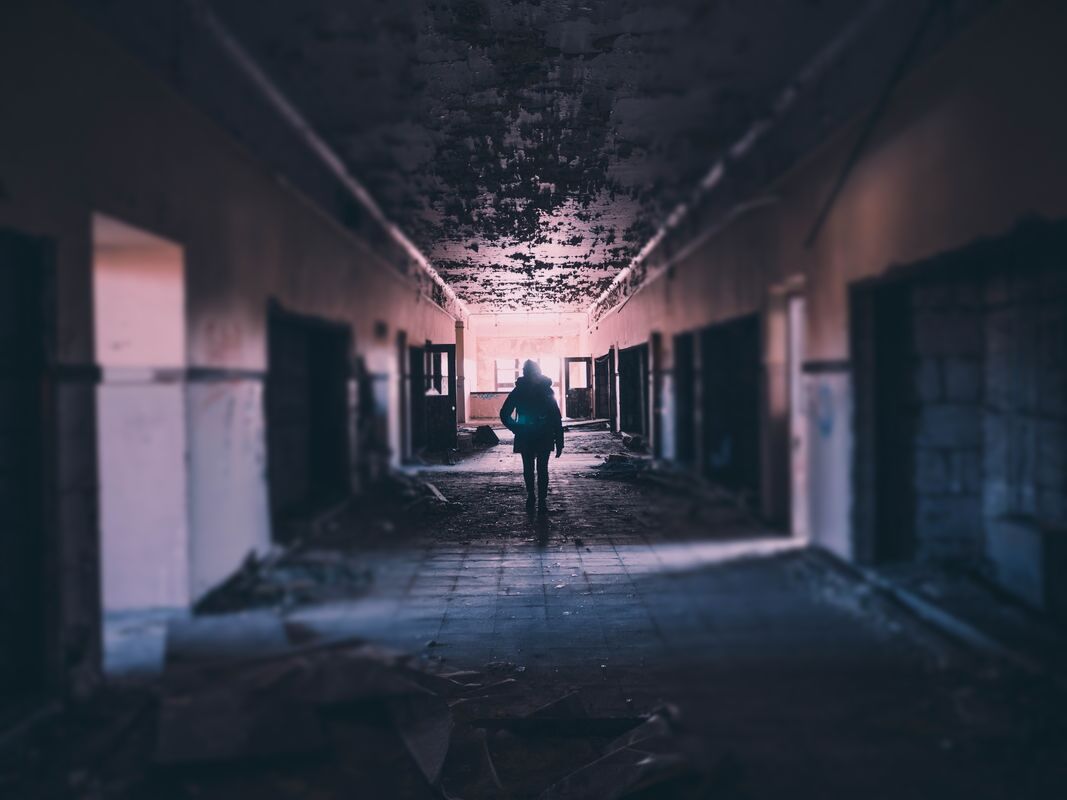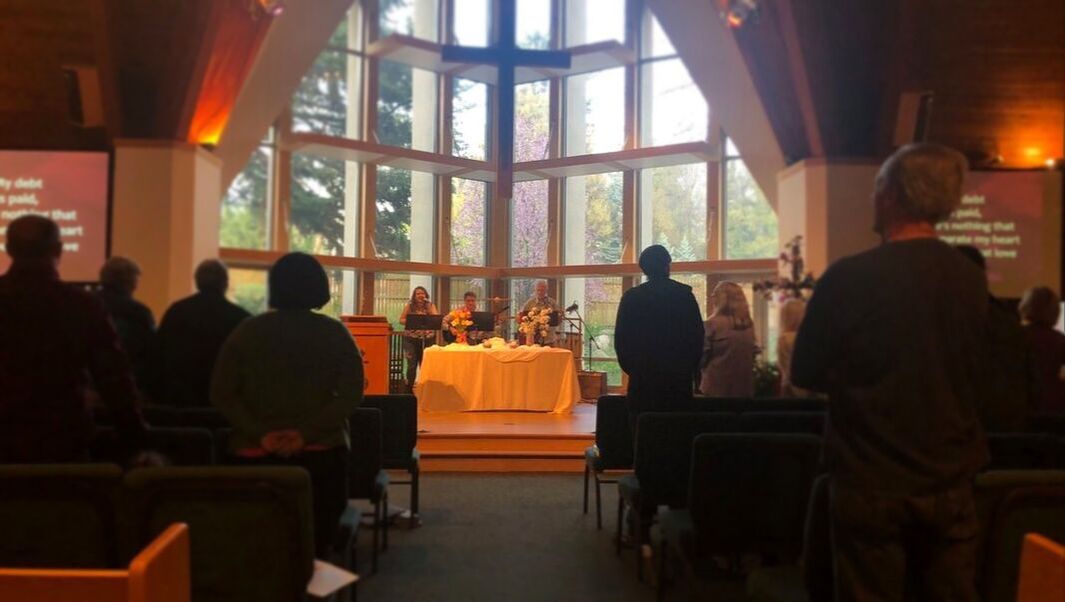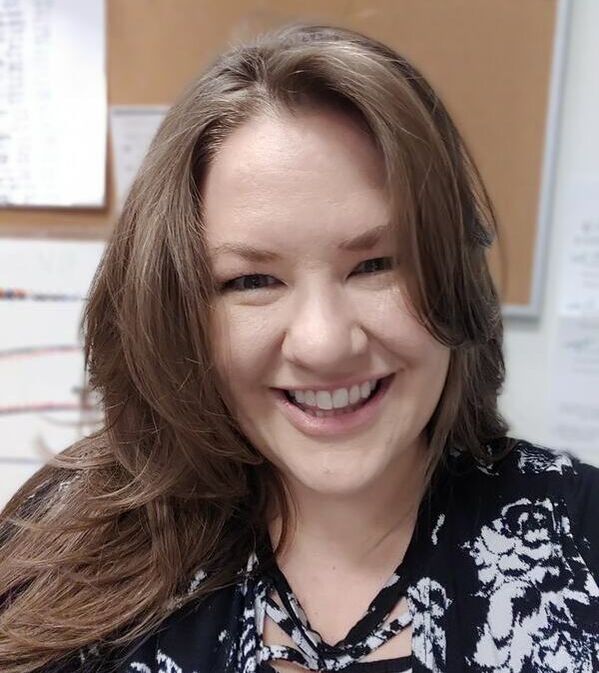|
An abbreviated version of this article was originally shared on May 6, 2019, on the blog "We Talk. We Listen." I’ve never really fit in anywhere - I’m just one of those people, I suppose. Oh, sure, I can camouflage with the best of chameleons, pick up the lingo, blend in...but ultimately I hear the message (vocalized or not) that I don’t belong. Perhaps you’ve felt like this before, or you can at least sympathize and recognize that people feel this way all the time. But surely there is a place for everyone in the church, right? “All are welcome,” right? When my spouse and I moved to Utah in 2015, we looked for an ELCA church with a contemporary service - we were both ELCA Lutherans and contemporary music is more our language than old, strophic hymns. There was only one in the area, so we quickly settled there and became ingrained in various ministries and leadership roles. We were there for a couple of years, feeling settled, active in various ministries and activities, including me leading contemporary worship. During that time, this idea came to me for a modern, inclusive, ecumenical (inter-church and inter-denominational) worship service. Yeah, that’d be cool, I thought. Maybe with dinner. Sunday evenings, for people who can’t or don’t attend Sunday mornings. These thoughts trickled in over several months, as thoughts do. Then one day, while I was working on something completely unrelated, this word appeared in my mind: Recovery. Well, crap. I’d always hated when churches “name” a service - it usually just comes off as trying too hard to be relevant, and there’s almost never an explanation for the name, just a random word like “The Edge” or “Summit” or “The Point” or anything else that sounds fancy. But “Recovery” instantly struck a chord. It was like the first flick of a lighter that actually catches a flame. It just stuck. So many of us are recovering from harm and abuse thrust upon us by society and by the church. So many of us are recovering from beliefs and traditions, man-made as a method of control, rather than God’s liberation and love for all. So many of us are recovering from our own sin, our own part in the kyriarchy, our own learned behaviors and attitudes that we inherited; trying to overcome these misconceptions so that we can practice love instead of exclusion. Many of us also feel the need to recover, as in reclaim, what has been given to us by God and what man has threatened and attempted to steal away. Our rights, our freedoms, our liberation, our grace, our call. And, as a friend recovering from substance use pointed out, recovery is also about coming together as a community, open and vulnerable. Is faith itself not exactly this - recovery? Through my work in churches and my time in the pews, I've have experienced and witnessed firsthand - and heard and believed other people's testimonies of - the difference between greeting and welcoming, tolerating and supporting. My spouse and I have fought for inclusion for ourselves and for others. But when the amount of progress is so little compared to the amount of harm and suffering, it is time for a bigger change. We did the “church tour” thing, where you try to find a church home, a congregation that feels like a good fit. It’s a bit like dating, mixed with looking for a place to live, mixed with being the new kid in class, mixed with job hunting. Not knowing where to start, I put together a literal spreadsheet of churches to visit, including churches in denominations that were in formal communion with the ELCA [sort of pre-approved flavors of Christianity, I guess], bigger non-denoms with contemporary worship, a non-creedal Unitarian Universalist church, a movie theater church, whatever I could find. Every church in the area that offered contemporary worship was on the list, unless they were the not-so-rare church that was obviously not fully inclusive of women, POC, or LGBTQ+ communities. Also on the list, even if they only offered “traditional” super-old-hymn-based worship, was every ELCA, UMC, PCUSA, Episcopal, and UCC church. I’d interacted with a lot of local churches through ministry and professional contexts, so some congregations were either specifically added or specifically left off the list based on that. But something had changed inside - whether something great had broken or whether something broken was healing is debatable, but I suspect it’s a looping cycle of both. As the song goes, “I once was blind, but now I see.” I couldn’t help noticing things that were exclusionary and limiting: steps (no ramps) leading up to the altar; only gendered bathrooms; ADA inaccessibility; discussions of “church culture” steeped in eurocentricity; support of colonialist “ministries”; lack of any community service activities; public speaking without sound amplification; only small-print bulletins; declaring that young people are the “future of the church” but obviously not the present; insistence that the congregation jump between bulletins and multiple worship books, and refusal to use screens for accommodation; stolen images used on slides and in documentation; “men’s” groups and “women’s” groups; all-English-speaking choirs butchering hymns in Spanish, a language clearly none of them spoke; an insistence that everyone bring a dish for potlucks; sending urgent prayer requests for police killed in the line of duty but not for Alton Sterling, Philando Castile, and countless others; opportunities for leadership that did not make any attempt to accommodate work schedules; un-captioned videos on websites and other website inaccessibilities; hymns with harmful theology (but they were “traditional”!); unexplained insider church jargon; a clergy-only pulpit; etc., etc., etc. Microaggressions and overt harm abound in churches as they do in society at large, and a single person cannot even perceive them all. The walls of the church do not block out the kyriarchy, the false lords of whiteness, male-ness, cis-ness, hetero-ness, rich-ness, Europeanness, English-speaking-ness, grad-school-educated-ness, able-bodied-ness, allistic-ness, elite-ness… Kyrie eleison. One Tuesday morning in January 2018, I wrote the following intro/explanation into a Word document: A new worship service with some liturgical structure and traditions at its foundation, but stripped of man-made exclusivity and kyriarchical influences as much as possible, leaving God-given grace and mercy given for all souls. A space and time for progressive Christian worship where every individual is affirmed as inherently valuable to God, and our call to love God and love one another is kept a focal point. A worship service for deprogramming; for unfundamentalists; for those pushed aside by historical man-made structures; for women; for people of color; for the LGBTQIA community; for people with disabilities; for immigrants; for indigenous peoples / first Americans; for families of one and families of many; for children and youth, the elderly, the young-ish, and the middle-aged; for the oppressed, the recovering oppressor, and those who are both; for the love of all humankind. Our recovery. A few days later, as my Word document grew well past any reasonable length, I built a website instead, to serve as a living document that anyone could access at any time. Whenever I briefly mentioned the idea to someone who wasn't an active church 'leader', people perked up and asked for more details. People who grew up in Utah, people who moved here from other cities, people who didn’t even live here now; people who had never really attended church, people who had felt forced out by the church, people who were currently serving in various capacities in the church; white people and people of color, various genders, young people and old people, progressives and conservatives and moderates, LGBTQIA+ folx and allocishets... They were all interested. Some even signed themselves up to help every week, not having attended yet but so drawn to the mission and vision. People said they needed it. So in early 2019, after countless calls and emails and meetings and visits, I grew tired of waiting for existing churches and clergy to be on board. I grew tired of waiting - yet again - for “The Church (™)” to accept this community that was begging for space. God makes room. Where institutions do not, where individuals do not, where oppression reigns, God disrupts the status quo and makes room. Some forces are too strong and inevitable for mere mortals to control. Can you keep a baby in the womb when the time has come for birth? Can you hold back floodwaters when the dam breaks? Can you withhold God-given grace and mercy and acceptance? I acknowledged myself out loud as “dechurched” and set my mind: “f--- it, I’m just gonna do it.” It was time to light the match. This is literally a salvation issue. There is simply no other way to explain it. When the church excludes people, regardless of the church’s intention, those people receive the message that they are excluded from God’s grace and mercy. This is a lie, but having been in that situation myself, I can testify that it feels like probably the deepest, most permanent wound. We had to do an Easter service. In an ideal world (ha!), we’d be ready to start regular weekly services, we’d have a budget and funds, and Easter would just be a grand kickoff. But Easter is such a big deal - celebrating the resurrection, Easter is hope, new life, and promise. Another Easter couldn’t pass by without Recovery. We’d sing praises from a random rooftop or parking lot if we had to, but people needed this. I heard those exact words from multiple people, including dechurched folks, folks getting crapped on at their current church, even some clergy members, and my own inner voice: “I need this.” I wasn’t sure how many people to expect – 10? 200? (With dinner planned, there were lots of loaves & fishes jokes.) I admit, I was worried - what if nobody attended? What if it was just the band and the readers and the preacher, and we were just presenting a service for ourselves? “It’s okay - it’d still be worth it,” said one of the guitarists. So the day came. April 21, 2019. Easter. I wore my most comfortable jeans, which happen to have backed destruction (i.e., hole-y with patches), and a tank top with a pretty floral pattern. I’d tried on so many outfits, from typical Easter dresses to nice blouses, but finally remembered that this was supposed to be a service without pretense. So I wore what I felt comfortable in. We had all sorts of people! From ages 4 to 70-something. LGBTQIA+ people and straight people. People of color and white people. People who speak Spanish and English and ASL. People who’d attended other Easter services earlier that day, and people who hadn’t been in years (or maybe at all). People who are part of a Christian denomination, people who are simply “Christian,” people who are Pagan, people who don’t really know what label to use. Autistic people and allistic people. People with disabilities, visible and hidden. Radical leftists and conservatives. Cat people and dog people and reptile people. All of them God’s people. We ate dinner together, and when we had all finished, we moved into the sanctuary together for the Gospel, a brief sermon, and prayers, interspersed with a variety of music. And now the coals are smoldering. We are trying to practice what Jesus preached. Open commensality, where everyone has a place at the table. Where space is held. Where room is made. Where we love God and love our neighbor (and everyone is our neighbor). We won’t be perfect, but we are going to continually try to be better. To love better. Because no matter how well you fit in with the world, you fit in with God. Since Easter, we took some time to celebrate Pride - including participating again in the annual Utah Interfaith Pride Service, and leading an annual Pride service at a local UCC church. The next immediate plans for Recovery are to do some fundraising to help with current and future costs; and line up plans and resources so that we can finally start with weekly services. In the long run, this will most likely be a separate 501(c)(3), to promote ecumenical ministries, progress, and worship. Maybe with our own building - maybe more of a true community center, that also holds worship. In my head I call it “faith-supported” rather than faith-based, to allow room for those uncomfortable with traditional/historic institutions of faith. For now, I am still pursuing the idea of having one congregation host us, as a fiscal sponsor with a budget line item and as a physical site host, as a shared inter-church ministry (much as one church may host a food pantry or a preschool). Continually, constantly, I am trying to break out of the restraints of “tradition” and kyriarchy, to let God’s radical love make room. I am dechurched, but never de-faithed. Holy Spirit, set our hearts ablaze.
0 Comments
Leave a Reply. |
PostsHere is it, y'all: love changes things 8/7/20
Good Friday in the Midst of a Pandemic 4/10/20 Wrestling with Faithfulness and Transformation (a sermon) 10/21/19 Healing of the Outcasts (a sermon) 10/18/19 Reckon-ciliation (a poem) 7/19/19 The Road to Recovery 6/26/19 Perpetuating Sins of the Church 8/16/18 It's Tuesday and I'm Overwhelmed 5/8/18 Music is a Language 5/3/18 Skipping a Meeting 4/10/18 Spark (a poem) 4/5/18 Recovery 4/4/18 A New Old Song for Holy Saturday 3/31/18 Good Friday? 3/30/18 Who are the Leaders in Your Church? 1/2/18 |



 RSS Feed
RSS Feed
